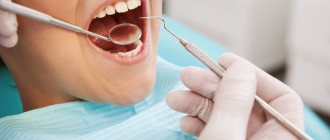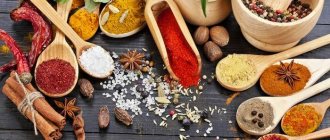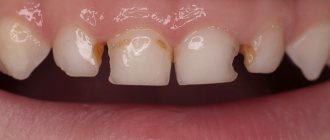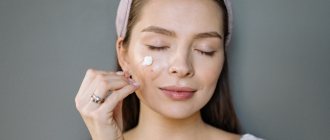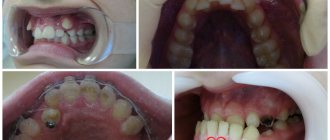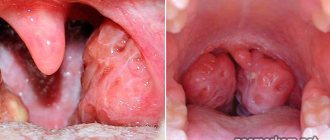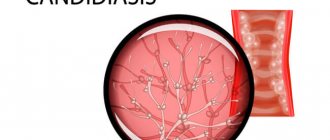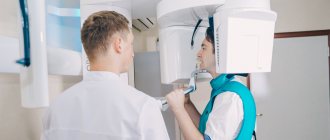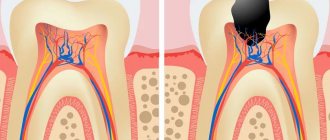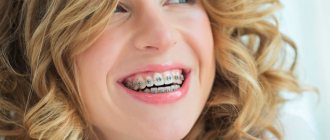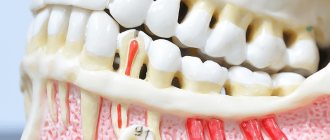Complications of bruxism
How the disease can be complicated if symptoms are ignored and intervention is delayed:
- hypertrophic changes in facial muscles;
- difficulties in mobility of the lower jaw;
- gingivitis, periodontitis, stomatitis;
- fibrosis of soft tissues;
- lichen planus on the mucous membranes of the oral cavity;
- malocclusion;
- carious lesions;
- grinding down teeth to the base;
- joint dysfunction;
- tooth loss;
- violation of facial aesthetics;
- depression, sleep problems.
Causes of Bruxism
There are several theories about the appearance of bruxism in adults. Psychological theory attaches great importance to the emotional state of a person in the development of the disease. Thus, factors favoring the development of bruxism may be the following:
- stress;
- high psycho-emotional stress;
- social and everyday disorder, troubles;
- frequent affective states.
The disease is called the disease of businessmen. People who undergo high psycho-emotional stress and take on great responsibility experience tension, which leads to involuntary muscle spasms during sleep. But it is important to understand that positive-minded patients can also suffer from this disease.
According to the neurogenic theory, the causes of bruxism in adults lie in disruption of the central and peripheral nervous system. This leads to neurological and movement disorders, muscle spasms. The validity of this theory is confirmed by the fact that, along with bruxism, sleep disorders (apnea, snoring, somnambulism) are often observed; tremor, epilepsy, enuresis - bedwetting. Tonic muscle tension can also be associated with damage to the trigeminal nerve.
Dental theory is based on the assumption that bruxism develops as a result of disturbances in the structure and function of the dental system. These include the following:
- bite defects;
- incorrect position of teeth;
- supernumerary teeth;
- crowded teeth;
- violation of the integrity of the dentition (partial adentia);
- incorrectly selected dentures and orthodontic structures;
- overestimation of fillings according to the bite;
- diseases of the temporomandibular joint.
Dental diseases lead to uneven distribution of the chewing load, and therefore the chewing muscles do not work properly. Her overexertion leads to nighttime cramps.
According to osteopathic theory, muscle contraction is an attempt by the neuromuscular system to eliminate blockage of the cranial sutures and restore craniosacral rhythm. This may be the result of birth trauma, malocclusion and posture, diseases of the cervical spine, etc.
Other theories about the origin of bruxism are not widely accepted, but some researchers link the problem to impaired nasal breathing, gastroesophageal reflux disease (GERD), parasitosis, frequent chewing of plates or pads, and other factors.
In any case, the causes of bruxism in an adult can be different, so it is difficult to do without a comprehensive diagnosis and the involvement of several specialized specialists.
Ask a Question
Why does muscle spasm occur that causes teeth grinding?
The causes of bruxism can be different, but they can act as a complex or be a single factor. The pathogenesis of the disease may include:
- Psychological problems - practicing doctors believe that the root cause of teeth grinding in seven cases out of ten is stressful situations, emotional overload, nervous tension, which bring anxiety and overstimulation of the psyche, which provokes involuntary contractions of the muscular frame of the jaw.
- Dental dental anomalies - absence of elements of the dentition or supernumerary teeth, unsuccessful braces or prosthetics, malocclusion, etc.
- Inflammation of the nasopharynx, sinusitis, rhinitis, the presence of polyps, deviated nasal septum, causing discomfort, difficulty breathing, infections in the oral cavity, etc.
- Parkinson's and Huntington's diseases often cause symptoms such as bruxism.
- Muscle spasms in the jaw area can be a result of a skull injury.
In addition, experts note that bruxism is of a hereditary nature, that is, predisposition and provoking factors give impetus to the disease. Teeth grinding can also be a bad habit, such as biting nails, biting lips, pillow corners, pencils, etc.
Signs of Bruxism
An episode of nighttime teeth grinding lasts about 10 seconds. The number of episodes may vary and they may occur every night or occasionally. A characteristic symptom is grinding or clicking of teeth, but the patient himself rarely notices this feature, because sleep is not interrupted. Usually the patient learns about the problem from the lips of relatives and people living with him.
Associated symptoms of bruxism are the following:
- pain in the jaw, teeth;
- headache;
- pain in the facial muscles;
- dizziness;
- drowsiness.
If an adult grinds his teeth
Approximately 10-15% of the total number of adult dental patients suffer from bruxism. It has been noted that this problem occurs much more often in people of certain professions. That is, for specialists who require constant concentration of attention, high precision and scrupulousness for their work (surgeons, jewelers, architects, etc.). If the patient is already aware of his bruxism, a visit to the dentist should not be ignored.
If the disease lasts for a long time, the teeth can literally wear down. Therefore, the patient needs to: try to avoid stress, learn to relax, introduce solid types of vegetables/fruits (carrots, apples, cabbage) into the diet, not eat at night, but rather take a soothing warm bath. And be sure to visit our clinic and receive qualified medical treatment.
Diagnostic methods
Diagnosis of bruxism involves studying the patient’s complaints, as well as assessing indirect signs based on the results of a routine visual examination. The leading method of objective diagnosis is the use of Brux Checkers - special mouthguards that are made on the basis of a plaster cast of the patient’s jaw. These aligners allow the detection of occlusal obstructions. The doctor issues brux checkers to wear overnight, after which the patient submits them to the clinic for analysis. Using diagnostic aligners, a specialist determines which teeth bear the greatest load.
Electromyography and polysomnography methods make it possible to register the pathological activity of the masticatory muscles and confirm the diagnosis of bruxism.
But, as a rule, it is possible to understand the reasons only with the help of comprehensive diagnostics. So, in the case of bruxism in adults, psychosomatics may occur, so consultation with a psychologist or psychotherapist will be required.
Tips for parents
To have a restful sleep, instead of watching cartoons, outdoor activities and computer games, take a walk down the street in the evening. Before going to bed, a child can take a relaxing bath and listen to a good fairy tale that does not contain scary characters.
Contact your dentist even if there are no problems with your teeth, but bruxism is present. He will select a special mouth guard for night wear. It does not eliminate grinding, but protects teeth from abrasion.
Half of children grind their teeth, so there is no need to panic at a single grinding sound. You should be concerned about frequent squeaks.
To prevent a child from grinding his teeth, the cause must be found and eradicated. Make sure he avoids stressful situations, eats right and doesn't overwork himself.
Complications of bruxism
If the disease is observed for a long time, pathological abrasion of the tooth enamel, increased sensitivity of the enamel, and the appearance of a wedge-shaped defect, cracks and chips may develop. Constant trauma to the periodontal tissues can lead to periodontitis, loosening and loss of teeth. The service life of fillings and orthopedic structures (prostheses) in patients with bruxism is shorter due to high mechanical load.
The consequence of the disease can be dysfunction of the temporomandibular joint, accompanied by pain in the jaw and neck, hypertrophy of the masticatory muscles.
Frequent injuries to the soft tissues of the oral cavity can lead to inflammatory diseases: gingivitis, periodontitis, stomatitis.
Pathological closing of the jaws during sleep complicates orthopedic and orthodontic treatment. Many dental restoration methods may not be available to patients, so it is important to pay attention to the disease in order to be able to receive comprehensive care in case of dental diseases or tooth loss.
When it appears
According to statistics, bruxism, also known as grinding teeth in sleep, occurs in 90% of people at least once in their lives, but in only 5% it is so severe that it requires the intervention of a specialist. At the same time, teeth grinding is detected in 50% of healthy children and occurs during the eruption of the incisors.
Also, grinding depends on the stages of sleep, most often characteristic of the slow phase. Grinding of teeth in a dream is expressed in the form of repeated clenching and rubbing of teeth, the sounds produced are unpleasant, parents begin to panic, regardless of the fact that the child may not be aware of the problem, but in the morning he may feel pain and discomfort in the face and joints of the lower jaw.
Another form of bruxism is associated with side effects of medications.
Bruxism most often leads to tooth wear and gum damage. Adult bruxism usually begins in late childhood in healthy children.
This type of disorder is also observed in children with cerebral palsy and mental retardation, even during wakefulness.
In this case, parents complain about increased tooth wear and creaking. Less commonly, epileptic seizures may be suspected; in unclear situations, polysomnography or VEEG monitoring is performed.
Treatment methods for bruxism
Comprehensive treatment of bruxism may include medication, psychotherapy, physical therapy, and dental methods. This approach demonstrates the greatest efficiency.
The doctor will develop a treatment plan based on the severity of the disorder. It is very important to identify the causes in order to select adequate therapy.
In the case of exposure to psychogenic factors, the basis of treatment is cognitive behavioral therapy: the patient’s mastery of relaxation and self-control methods, psychotherapeutic trainings, art therapy, etc.
Drug therapy is aimed at reducing convulsive muscle activity. The main groups of funds include:
- magnesium, calcium preparations;
- B vitamins;
- mild sedatives;
- sleeping pills, etc.
Treatment of bruxism with botulinum toxin is also classified as a medicinal method. Botulinum toxin injections block nerve impulses entering the muscles, which relieves the muscles from involuntary spasms. The effect of botulinum toxin preparations is not permanent - after several months the injections are repeated. It is important to understand that this is rather a way to combat the symptom. Injections do not help eliminate the causes of the disease.
In some cases, osteopathic treatment may be recommended: manual therapy, massage, warming up the muscles with compresses.
The dental approach involves the participation of different specialists: periodontist, dental therapist, orthopedist, orthodontist. In the absence of pathologies in the dental system, protective rubber or plastic mouth guards are made, which helps prevent the consequences of bruxism in adults. According to indications, the following activities can be carried out:
- selective grinding of teeth;
- correction of bite by wearing mouthguards, braces;
- restoration of the integrity of the dentition: prosthetics and implantation.
Correction of bite defects is possible only after the patient’s condition improves. The installation of fillings and veneers, and splinting of teeth may be postponed due to the high risk of damage to structures.
Prevention of bruxism
Bruxism can be prevented by paying attention to oral health: it is important to see a dentist in a timely manner, treat diseases of the teeth and gums, and restore the integrity of the dentition if teeth are lost. If you have bite defects or crowded teeth, you should consult an orthodontist.
Prevention involves normalizing the psycho-emotional state, giving up bad habits, coffee and energy drinks; maintaining a daily routine and proper nutrition.
Specialists from STOMA clinics will help adult patients get rid of bruxism: with us you can get help from all specialized doctors - from dental therapists to periodontists and orthodontists.
Why does the problem appear in children?
- malocclusion,
- bruxism as a reaction to a bad psychological “climate” in the family, kindergarten, school. Pathology may indicate an excess of impressions or the process of adaptation to something new (school, moving to another city). A small child grinds his teeth mainly because he has a fragile child's psyche. Until the age of 7, there is no need to worry too much about this, since after this age in most children the symptom goes away on its own. If it persists and repeats frequently, then you need to see a doctor.
- teething: when the baby’s milk elements are cutting, the baby’s gums become swollen and itchy, so whenever possible he tries to alleviate his condition. For example, he clenches his jaws tightly, rubs his teeth against each other in order to scratch the inflamed mucous membranes,
- heredity,
- inflamed adenoids,
- bad habit: some kids begin to deliberately grind while playing and trying out new sensations, and then it becomes a habit for them.
On a note! There is still a widespread belief that a child is infected with worms if he grinds his teeth while eating during the day and while sleeping at night. This theory is based on the fact that during infection with helminths, a person’s salivation increases, and he may begin to involuntarily move his lower jaw. However, the relationship between bruxism and worms has not been scientifically proven.
